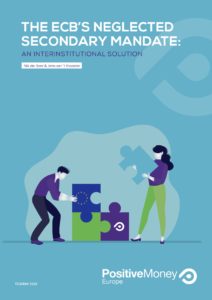Acting on a long-standing recommendation from Positive Money Europe, the European Parliament’s ECON Committee announced last week that it is ready to negotiate a new accountability framework with the ECB. It remains unclear however if the ECB will join the initiative.
On Monday, November 15, the Economic and Monetary Affairs Committee (ECON) of the European Parliament held a quarterly Monetary Dialogue with the President of the European Central Bank Christine Lagarde. At the beginning of the hearing, the Chairwoman of the Committee Irene Tinagli announced that the European Parliament stands ready to start negotiations on the Interinstitutional Agreement with the ECB. The statement is of great importance as it shows the willingness of MEPs to reform the accountability practices of the ECB without affecting the primary mandate of the ECB.
Back in 2019, Positive Money Europe published a report in which Sebastian Diessner and the Executive Director of Positive Money Europe Stanislas Jourdan advocate for a stronger role of the European Parliament in the accountability framework of the ECB. Among other things ,the authors recommend formalising the current accountability framework in an interinstitutional agreement between the ECB and the European Parliament, which already exists in the context of the ECB’s supervisory activities.
In December 2020, Positive Money Europe published a new briefing outlining 12 recommendations to guide the conversation. Among the 12 recommandations, we suggested improving the monetary dialogue hearings, allowing ECON to shortlist possible candidates in advance of the selection process for the members of the ECB Executive board and prioritizing the secondary mandate of the ECB.
Later, the ECON Committee held a hearing specifically on ECB accountability, inviting academic Rosa Lastra and former ECB President Jean-Claude Trichet, who echoed some of our proposals. During the hearing, Trichet stressed that applying the principle of transparency in the process of accountability is crucial and encouraged “more dynamic questions” by MEPs during the Monetary Dialogues.
In practice, the secondary mandate requires the ECB to “support the general economic policies in the Union with a view to contributing to the achievement of the objectives of the Union as laid down in Article 3 of the Treaty on European Union.” Despite its importance, the secondary mandate is virtually never mentioned alongside the primary mandate and remains underreported.
 In a recently published report on the topic, Dr. Nik de Boer and Dr. Jens van ‘t Klooster stress that the ECB should at the very least explain to the European Parliament how it considers the secondary mandate when deciding on monetary policy. The secondary mandate is as legally binding as the ECB’s primary mandate prescribing price stability, which should be reflected in its monetary policies and refinancing operations.
In a recently published report on the topic, Dr. Nik de Boer and Dr. Jens van ‘t Klooster stress that the ECB should at the very least explain to the European Parliament how it considers the secondary mandate when deciding on monetary policy. The secondary mandate is as legally binding as the ECB’s primary mandate prescribing price stability, which should be reflected in its monetary policies and refinancing operations.
In response to the ECON committee’s push, President Lagarde gave a vague reply to MEP Urtasun when asked if she would agree to an interinstitutional agreement between the ECB and the European Parliament. More specifically she said: “I am not that keen on a particular label, and we should be mindful of not undermining the treaty provisions that actually provide for the relationship between the ECB and the European Parliament. I am more interested in what we can effectively operationalise between us than in the actual title of any framework that we organise amongst ourselves.”
As negotiations are only at the very beginning, we expect the ECB to provide clarification on how it intends to proceed and what it is proposing in the bargaining process.
We will be closely monitoring the next steps and providing our input to ensure the secondary objectives are part of the negotiations.

